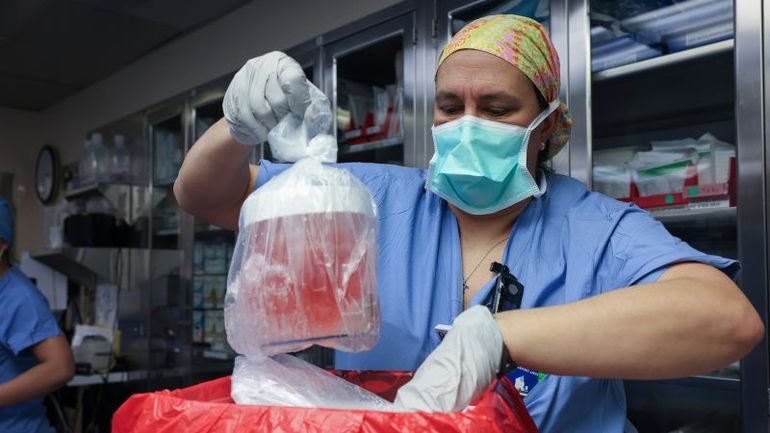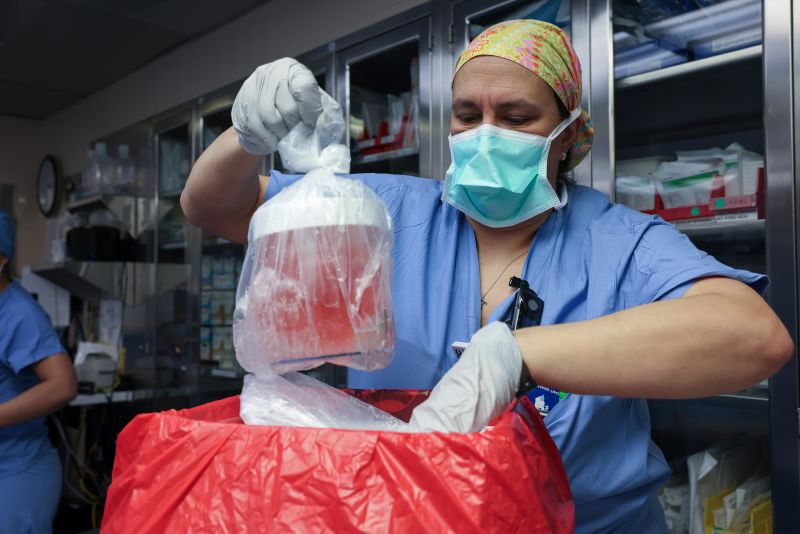
Historic First: Human Receives Transplanted Pig Kidney

In a groundbreaking achievement, doctors at Massachusetts General Hospital have achieved the unprecedented feat of conducting the world's first successful transplant of a genetically modified pig kidney into a human recipient. This remarkable medical milestone marks a significant advancement in organ transplantation research and offers hope for future patients in need of life-saving treatments.
Doctors at Massachusetts General Hospital have achieved a groundbreaking milestone by performing the first-ever transplant of a genetically modified pig kidney into a human recipient.
The recipient of this historic procedure is Rick Slayman, a 62-year-old man from Weymouth, Massachusetts, who has been battling end-stage kidney disease.
Slayman, a patient of the hospital's transplant program for 11 years, shared in a statement that he had previously received a kidney transplant from a human in 2018 due to diabetes and high blood pressure. Unfortunately, this kidney started failing after five years, leading him to go back to dialysis in 2023.
Last year, Slayman was diagnosed with end-stage kidney disease. At this point, his doctors recommended that he consider trying a pig kidney as an alternative.
Slayman expressed in a written statement that donating his organ was not just a personal benefit, but also a source of hope for many others in need of a transplant to stay alive.
Dr. Tatsuo Kawai, the surgeon who conducted the operation and director of the Legorreta Center for Clinical Transplant Tolerance, mentioned that the organ donated was identical in size to a human kidney.
When the kidney was placed inside, Kawai mentioned that it quickly turned pink and started producing urine. This resulted in a round of applause from everyone in the operating room.
During a news briefing, Kawai expressed, "It was honestly the most stunning kidney I've ever laid eyes on."
Doctors announced in a news conference on Thursday that Slayman is doing well in his recovery and is likely to be released from the hospital soon.
This marks the third time that a pig organ has been transplanted into a human. The first two instances involved heart transplants for patients who had no other options. These transplants were done under special regulations that allow experimental treatments for patients in critical conditions. Unfortunately, both patients passed away a few weeks after the surgeries.
Nursing practice specialist Melissa Mattola-Kiatos removes the pig kidney from its box to prepare for transplantation.
Nursing practice specialist Melissa Mattola-Kiatos removes the pig kidney from its box to prepare for transplantation.
Massachusetts General Hospital
The organ came from a pig that was genetically modified by a company eGenesis to make them more compatible with humans.
Dr. Michael Curtis, CEO of eGenesis, expressed excitement about a groundbreaking procedure in medicine. He believes that this advancement has the potential to remove the obstacle of organ scarcity in transplantation. Dr. Curtis envisions a future where no patient will have to wait for an organ, ultimately saving lives.
Sign up for CNN Health's weekly newsletter to stay updated on the latest health news and developments.
Sign up here to receive The Results Are In with Dr. Sanjay Gupta every Tuesday from the CNN Health team.
"We are amazed by the bravery and kindness of this patient, who is a real trailblazer, making this significant advancement in the field of science and transplant medicine possible."
The demand for organs exceeds the available supply by a large margin. In the United States, 17 individuals pass away each day while waiting for an organ transplant. Kidneys are particularly scarce, with approximately 27,000 kidney transplants performed in 2023, while nearly 89,000 individuals remained on the waiting list for this organ.
Experts believe that xenotransplantation, which involves using organs from animals for human transplants, could play a crucial role in addressing the shortage of donor organs.
Editor's P/S:
The groundbreaking pig kidney transplant performed at Massachusetts General Hospital is a testament to the incredible advancements in medical science. It offers hope to countless individuals battling end-stage organ failure, particularly those in dire need of kidney transplants. The successful transplantation of a genetically modified pig kidney into a human recipient marks a significant milestone in addressing the severe organ shortage that affects millions worldwide.
This procedure has the potential to revolutionize the field of transplantation, potentially eliminating the need for patients to endure lengthy wait times for donor organs. The use of genetically modified pig organs, which are more compatible with the human immune system, could significantly increase the availability of organs for transplantation. This breakthrough holds immense promise for improving the lives of countless individuals and alleviating the suffering caused by organ failure.








